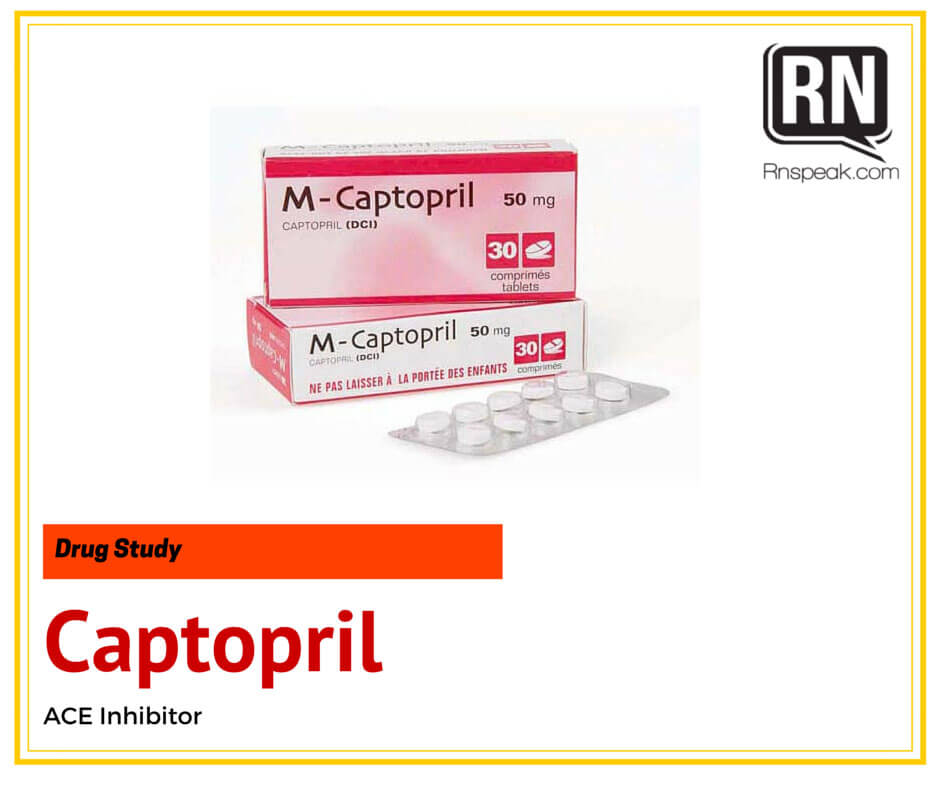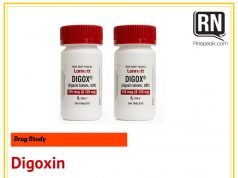
Generic Name: Captopril
Brand Names: Capoten, Acepril, Ace-Bloc, Bloc-Med, Capomed, Capotec, Captogen, Captor, Captril, Cardiovaz
Classification: ACE Inhibitor
Pregnancy Category: D
Route: Oral
Preparations: 12.5, 25, 50, 100 mg
Indication: Captopril is used alone or in combination of other drugs for the management of hypertension. It is also used in combination with other drugs in the treatment of heart failure after a heart attack. Also used to treat kidney problems caused by diabetic nephropathy.
Contraindications: Allergy to other ACE inhibitors. Aortic stenosis, outflow obstruction, renovascular disease. Pregnancy and Lactation. Caution in cases where patients also have Leukemia, COPD, renal or thyroid disease.
Action: Used to block the action of angiotensin converting enzyme (ACE) which is naturally produced in the body. ACE produces angiotensin II which causes constriction and narrowing of the blood vessels thereby increasing blood pressure. By blocking ACE, production of angiotensin II decreases allowing the blood vessels to relax and widen resulting in decrease blood pressure.
Therapeutic Effect: Lowers blood pressure and increases blood and oxygen supply to the heart in patients with hypertension. Decreases preload and afterload for patients with heart failure. Slows down or reduces progression of blood vessels disease within the kidney caused by high blood pressure in patients with diabetic nephropathy.
Dosage: Hypertension: Initial dose of 12.5 mg twice a day, increase gradually at 2-4wk interval. Maintenance dose of 25-50 mg twice a day, maximum of 50 mg thrice a day. Heart Failure: Initial dose of 6.25mg-12.5mg. Maintenance dose of 25 or 50 mg bid, maximum dose of 50 mg tid.
Diabetic Nephropathy: 75-100mg daily in divided doses.
Pharmacokinetics:
Absorption: Rapidly absorbed (75%) from the GI tract. Food decreases absorption.
Distribution: Widely distributed but does not cross the blood brain barrier. Crosses the placenta, small amounts enter breast milk.
Metabolism and Excretion: 50% metabolized by the liver. 50% excreted unchanged by the kidneys.
Pharmacodynamics:
- Onset: 15- 60 min
- Peak: 60-90 min
- Duration: 6-12 hr
Side Effects: hypotension, dizziness, dry mouth, itching, sleep problems, rashes, diarrhea, constipation, hair loss, dry irritating cough, changes in the way things taste, upset stomach, abdominal pain, shortness of breath, agranulocytosis, neutropenia
Interactions: Additive hypotension with other antihypertensive, phenothiazines, acute ingestion of alcohol and vasodilators. Hyperkalemia may result from concurrent use of potassium supplements or potassium-sparing diuretics, Antihypertensive response may be blunted by non-steroidal anti-inflammatory agents. Absorption may be decreased by antacids. Increases levels and may increase risk of digoxin or lithium toxicity. Probenecid decreases elimination and increases levels of captopril. Risk of hypersensitivity reactions increased by concurrent use of allopurinol.
Nursing Considerations
- Monitor blood pressure and pulse frequently.
- Monitor weight and assesses patient frequently for signs of fluid overload if with concurrent diuretic therapy.
- assessments of urine protein may be ordered. Proteinuria and nephrotic syndrome may occur with therapy.
- Monitor BUN, Crea and electrolyte levels periodically.
- WBC should be monitored prior to therapy and periodically thereafter.
- May cause false positive result for urine acetone
Patient/Family Health Teachings
- Instruct patient to take captopril exactly as directed. Missed dose should be taken as soon as remembered but not if almost time for next dose.
- Do not double doses.
- Instruct patient not to discontinue captopril therapy unless directed by health care provider.
- Encourage patient to comply with additional interventions for hypertension.
- Instruct patient and family on proper technique of blood pressure monitoring. Advice them to check blood pressure at least weekly and to report any significant changes.
- Caution patient to avoid foods containing high levels of sodium or potassium.
- Advice patient that any changes in taste sensation will reverse itself within 8-12 weeks.
- Instruct patient to change position slowly to minimize occurrence of orthostatic hypotension.
- Advice patient that exercising in hot weather may increase hypotensive effect.
- Instruct patient to consult with a health care provider before taking any over the counter medications or cold remedies.
- Advice patient of ingesting excessive amount of tea, coffee or cola.
- Advice patient to avoid driving or other activities that require alertness until response to therapy is known.
- Instruct patient to notify health care provider if rash, sore throat, fever, irregular heart beat, chest pain, swelling of face, eyes, lips or tongue and difficulty of breathing occurs.
- Emphasize importance of follow up examinations for monitoring purposes.
Nursing Diagnosis:
- Decreased Cardiac Output
- Knowledge deficit related to medication regimen
- Noncompliance







